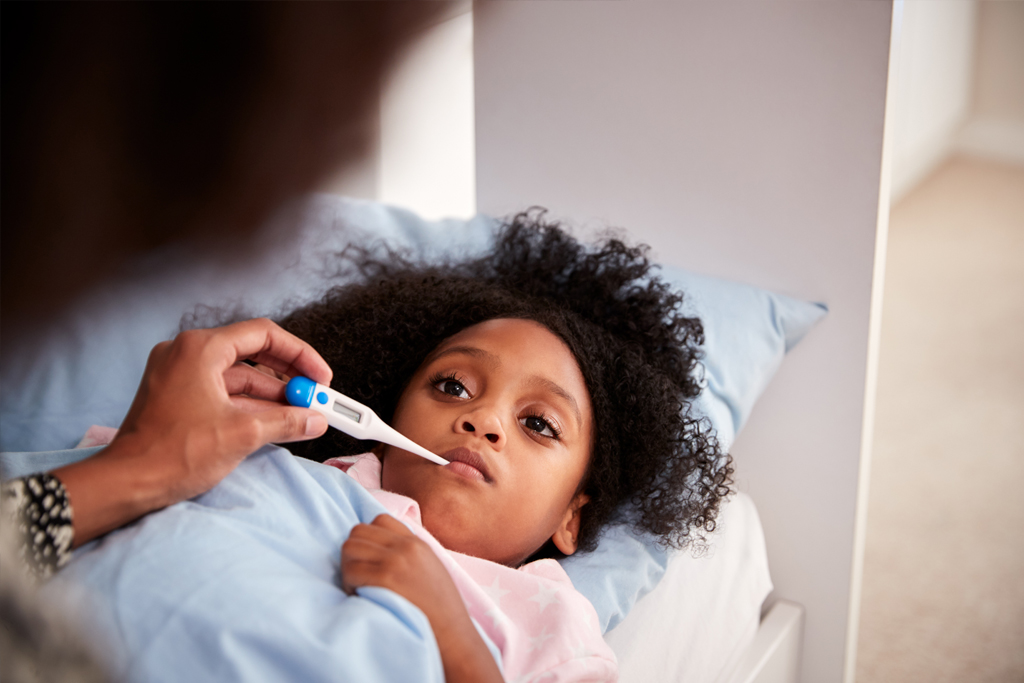What would you like to find out about today?
What are febrile seizures?
Febrile seizures or convulsions are caused by having a high temperature. They are not epilepsy. They can seem frightening, but they are unlikely to cause your child any harm or have any long-term effects.
Often the fever will be caused by an infection of some kind, for example:
- Chickenpox
- The flu
- Tonsillitis
Febrile seizures mostly happen in young children between the ages of 6 months and 5 years. They are most likely to happen between 12 and 18 months. If you have a family history of febrile seizures, your child is slightly more likely to have them.
They are the most common seizure type in children up to the age of 2.
Around 30 out of every 100 children who have had a febrile seizure will go on to have another. Of those 30, only about 3 will have more than 3 febrile seizures.
Different types of febrile seizure
Febrile seizures can be ‘simple’ or ‘complex’.
Simple febrile seizures are the most common type. They last for less than 5 minutes.
The seizure is a generalised tonic-clonic seizure and your child will lose consciousness. This means they won’t be aware of their surroundings. Their body will go stiff, and their limbs will begin to jerk.
Complex febrile seizures are less common. These might last longer than 15 minutes and your child could have more than 1 within 24 hours.
Complex febrile seizures can sometimes be focal. This means at first it only affects one side of your child’s body. Your child may stop what they are doing and not be aware of what is going on around them. They may stare, or move their eyes or head to the side. One side of their body might jerk.
Complex febrile seizures are more likely than simple febrile seizures to be linked to a serious infection like meningitis or encephalitis.
What should I do if my child has a febrile seizure?
First aid for febrile seizures
If your child has any type of seizure, it is important to know what to do. This will help keep them safe and lower the risk of any injuries. Although febrile seizures are not epilepsy, the first aid for them is similar to epileptic seizures.
Simple febrile seizures are often a tonic-clonic seizure. We have information on how to care for someone having a tonic-clonic seizure.
Complex febrile seizures can be a focal seizure. We also have information on caring for someone having a focal seizure.
St. John’s Ambulance has information on how to put a baby in the recovery position.
If it is your child’s first febrile seizure, they will need to go to hospital. They may have some tests there to understand the reason for their high temperature. These tests could include:
- Blood tests
- Urine tests
- A throat swab
- A lumbar puncture – this is where a sample of fluid is taken from the spine to check for bacteria or viruses. This is more common if your child is less than a year old or they have symptoms of meningitis like neck stiffness. To find out more about lumbar punctures you can visit:
Febrile status epilepticus
If a febrile seizure or repeated febrile seizures go on for longer than 5 minutes, this is known as febrile status epilepticus (FSE) and is a medical emergency.
Epilepsy Action has more information on status epilepticus and emergency medicines.
If your child is at risk of having status epilepticus in the future, you might be given emergency medicine to take home. You would use this if your child had another prolonged seizure.
Treatment for febrile seizures
Most febrile seizures do not need treatment.
If your child is very unwell with the fever, your healthcare team may check for serious causes. These could be illnesses like meningitis, encephalitis or sepsis. Often it is the infection that might need treatment rather than the seizure itself.
Medicine to lower your child’s temperature might help them feel more comfortable. But there isn’t anything you can do to stop a febrile seizure from happening.
You can find advice on how to look after a child with a fever on the NHS website.
If they have a bacterial infection or other serious infection, they may be given treatment for this.
Febrile seizures are not epilepsy, so it is unlikely the doctor will prescribe any long term regular anti-seizure medicines. This is because the side effects from these may be worse than the seizure itself.
Is there a link between febrile seizures and epilepsy?
If your child has had febrile seizures, there is a small chance they could have epilepsy when they are older. For every 100 children who have febrile seizures, 6 or 7 will go on to have epilepsy.
Your child is more likely to develop epilepsy if:
- They have complex febrile seizures or febrile status epilepticus
- They have a family history of epilepsy
- Your child only had a mild fever when they had their febrile seizure
Some epilepsy syndromes have febrile seizures as one of their symptoms. Sometimes they are the first sign that your child may go on to develop the syndrome when they are older.
Two of the syndromes that are linked to febrile seizures are:
These syndromes are very rare.
For most children, having an assessment with a doctor can rule out a serious cause for the fever. The doctor can give you advice on looking after your child if they have another seizure.
Got more questions?
Our expert advisors can help you with any questions you might have about febrile seizures or anything else related to living with epilepsy.






